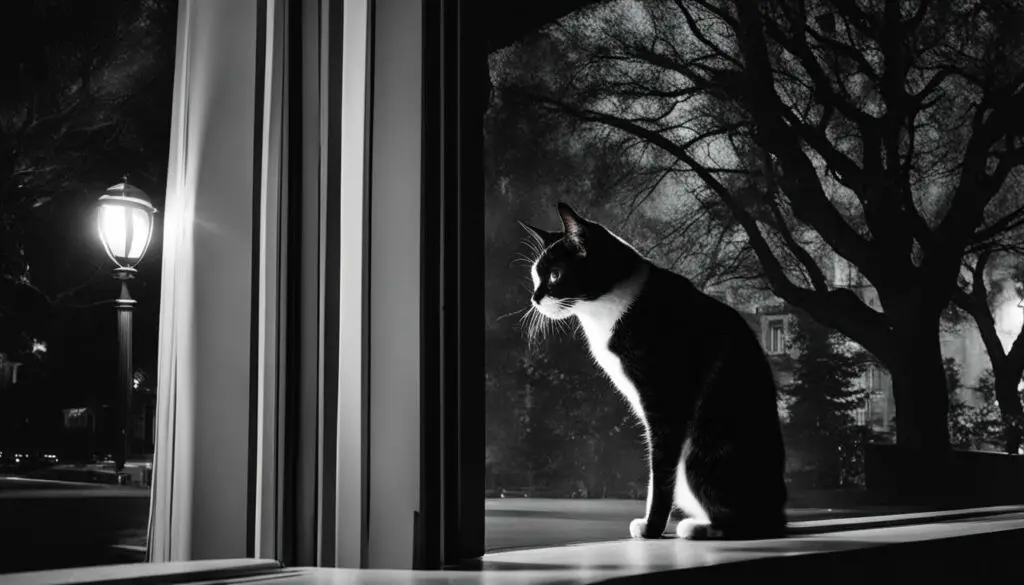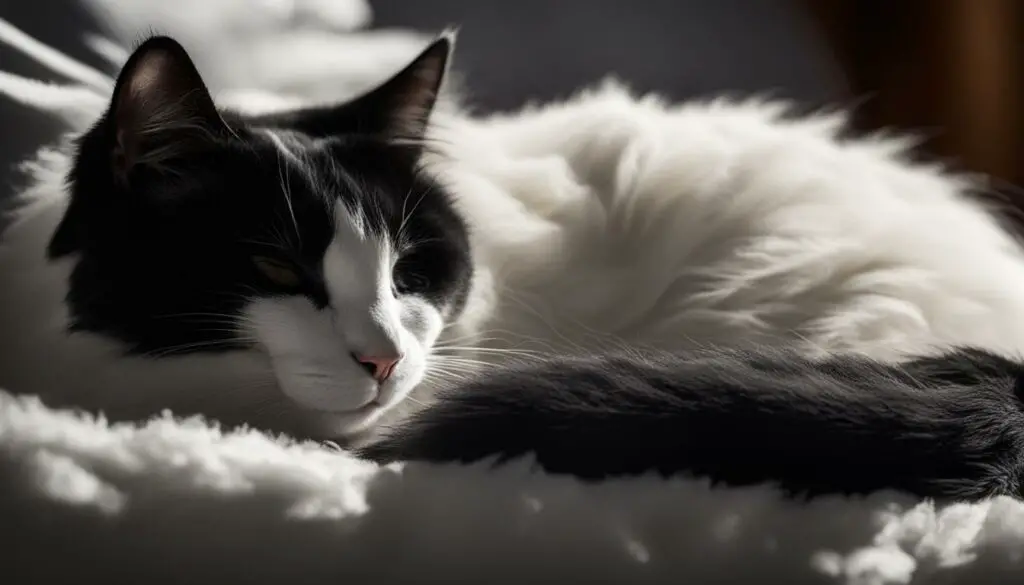As a cat owner, I understand the frustration that comes with a meowing cat in the middle of the night. It can be disruptive, leaving us tired and longing for a peaceful sleep. In this article, I will dive deep into the intricacies of why cats meow at night and debunk common misconceptions surrounding this behavior. By shedding light on feline nighttime behaviors, we can find effective ways to address this issue and restore tranquility to our nights.
Key Takeaways:
- Cats meow at night for various reasons, including nocturnal instincts, attention-seeking behavior, and communication.
- Nocturnal meowing can also be a sign of distress, stress, anxiety, loneliness, boredom, or underlying medical issues.
- It is crucial to understand the specific cause in order to implement effective interventions.
- Disciplining a cat for nocturnal meowing requires a positive approach through training and reinforcement, rather than punishment.
- Creating a suitable environment with ample playtime, exercise, and enrichment can help reduce nighttime disturbances.
Understanding Cat Behavior
When it comes to cat behavior, there are several factors to consider when trying to understand why cats meow at night. Cats are known to be nocturnal creatures, meaning they are naturally more active during the night. This nocturnal behavior can contribute to meowing during nighttime hours as cats may have heightened energy levels and a desire to explore their surroundings.
However, not all meowing at night is driven solely by nocturnal instincts. Cats may also meow to seek attention from their owners. Whether they want to be fed, played with, or simply crave some affection, meowing can be their way of communicating their desires. It’s important to pay attention to the context and frequency of their meowing to determine if it is attention-seeking behavior.
Furthermore, cats may meow at night due to various forms of distress, stress, anxiety, loneliness, or boredom. These emotions can manifest in excessive vocalization, particularly during the quiet hours of the night. Understanding the underlying emotional state of your cat can help address the root cause of their nighttime meowing and provide appropriate interventions to alleviate their distress.
Recognizing the Signs of Distress or Anxiety
It’s essential to recognize the signs of distress or anxiety in your cat. Some common signs include pacing, hiding, excessive grooming, changes in appetite, and aggression. These signs may indicate that your cat is experiencing emotional discomfort, which can contribute to their nighttime meowing. By acknowledging and addressing these underlying issues, you can help create a more harmonious environment for your cat.

In summary, understanding cat behavior is key to addressing nighttime meowing. Cats may meow at night due to their nocturnal instincts, as a way to seek attention, or because of distress, stress, anxiety, loneliness, or boredom. By recognizing the signs of distress and addressing the underlying emotional state of your cat, you can work towards reducing nighttime meowing and promoting a peaceful environment for both you and your feline companion.
Common Reasons for Nocturnal Meowing
Cat owners often wonder why their feline companions meow at night. There are several common reasons behind this behavior:
- Territorial Behavior: Cats are naturally territorial animals. They may meow at night to establish their presence and mark their territory.
- Mating Instincts: During mating season, unneutered cats may meow at night to attract potential mates. This behavior is more common in outdoor cats.
- Hunting Instincts: Cats have a strong hunting instinct, even if they are well-fed. They may meow at night to express their desire to hunt or to alert their owners of prey.
- Hunger: If a cat is hungry, they may meow persistently to get their owner’s attention and request food.
- Discomfort or Medical Issues: Cats may meow at night if they are experiencing discomfort or have underlying medical issues. It’s essential to monitor their behavior and consult a veterinarian if necessary.
Understanding the specific reason behind your cat’s nocturnal meowing can help you address the issue more effectively.

It’s important to note that each cat is unique, and their reasons for meowing at night may vary. By identifying the underlying cause, cat owners can take appropriate measures to manage this behavior and promote a peaceful sleep environment for both themselves and their feline companions.
Impact on Sleep Patterns
Cat meowing at night can have a significant impact on sleep patterns for both the cat owner and the cat itself. The consistent disruptions caused by the meowing can lead to sleep disturbance and sleep deprivation, affecting the overall quality of sleep for both parties involved.
When a cat meows at night, it can disrupt the sleep cycle of both the cat and the owner. Cats have a natural circadian rhythm, just like humans, and night-time disturbances can throw off their sleep patterns. This can result in sleep regression, where the cat struggles to establish a consistent sleep routine. Likewise, the owner’s sleep patterns can be interrupted, leading to fatigue and irritability.
“The consistent disruptions caused by the meowing can lead to sleep disturbance and sleep deprivation, affecting the overall quality of sleep for both parties involved.”
| Sleep Issues | Effects |
|---|---|
| Sleep Disturbance | The constant meowing can disrupt deep sleep, leading to fragmented rest and daytime sleepiness. |
| Sleep Deprivation | Ongoing sleep disturbances can result in chronic sleep deprivation, impacting cognitive function and overall health. |
| Sleep Patterns | The cat’s natural sleep patterns can be affected, resulting in irregular sleep-wake cycles and difficulties in achieving deep sleep stages. |
| Sleep Disorders | Long-term disruptions can contribute to the development of sleep disorders such as insomnia or hypersomnia. |
| Sleep Regression | Consistent meowing can lead to sleep regression, where the cat struggles to establish a consistent sleep routine. |
The Impact on Sleep Patterns
The consistent disruptions caused by the meowing at night can lead to sleep disturbance, sleep deprivation, disturbances in sleep patterns and cycles, and can interfere with the natural circadian rhythm of the cat. This can cause sleep disorders and sleep regression, which can have negative effects on the overall well-being and quality of life for both the cat and its owner.
Disciplining a Cat for Nocturnal Meowing
When it comes to disciplining a cat for nocturnal meowing, it’s important to take a positive approach that focuses on training and reinforcement rather than punishment. Cats are sensitive creatures, and negative reinforcement or scolding can cause fear and aggression, making the behavior worse instead of better. By using positive reinforcement techniques, you can effectively address the issue while maintaining a healthy and loving relationship with your feline friend.
Training your cat to curb nocturnal meowing starts with identifying the triggers and addressing them appropriately. For example, if your cat meows for attention at night, it’s essential to provide attention and interaction during the day to fulfill their social needs. Engaging in playtime and interactive activities can help drain their energy and keep them mentally stimulated, reducing the likelihood of disruptive behavior at night.
To reinforce positive behavior, reward your cat with treats, praise, or petting when they exhibit calm and quiet behavior during nighttime hours. This will help them associate quiet behavior with positive outcomes, encouraging them to continue this behavior in the future. Gradually, your cat will learn that nighttime is meant for sleep and relaxation rather than meowing for attention.
Common Disciplinary Myths: Debunked
Myth: Spraying cats with water or using verbal reprimands is an effective way to discipline them.
Reality: Spraying cats with water or scolding them may provide temporary relief, but it does not address the underlying cause of the meowing and can create stress and anxiety in your cat.
Myth: Ignoring your cat’s nocturnal meowing will make it stop.
Reality: Ignoring your cat’s meowing may actually intensify the behavior as they seek more attention. It’s important to address their needs appropriately and provide positive reinforcement for desired behavior.
Remember, disciplining a cat for nocturnal meowing requires consistency and patience. It may take time for your cat to adjust to new routines and behaviors, so it’s essential to remain calm and consistent in your approach. With proper training and positive reinforcement, you can help your cat develop healthier sleep habits and enjoy restful nights for both you and your feline companion.
| Common Disciplinary Myths | Reality |
|---|---|
| Spraying cats with water or using verbal reprimands is an effective way to discipline them. | Spraying cats with water or scolding them may provide temporary relief, but it does not address the underlying cause of the meowing and can create stress and anxiety in your cat. |
| Ignoring your cat’s nocturnal meowing will make it stop. | Ignoring your cat’s meowing may actually intensify the behavior as they seek more attention. It’s important to address their needs appropriately and provide positive reinforcement for desired behavior. |

Creating a Suitable Environment
When it comes to addressing cat meowing at night, creating a suitable environment plays a crucial role. Providing ample playtime and exercise can help keep your cat engaged and tire them out before bedtime. Schedule interactive play sessions that involve chasing toys or using laser pointers to simulate hunting. This not only releases their energy but also satisfies their natural instincts.
Environmental enrichment is another key aspect of creating a suitable environment for your cat. Incorporate interactive toys that challenge their problem-solving skills, such as treat-dispensing puzzles or catnip-filled toys. Additionally, investing in scratching posts can help redirect their urge to scratch away from your furniture. Make sure to place the scratching posts in areas where your cat spends most of their time.
Having hiding spots around your home is also beneficial for cats. These can be cozy beds or cat condos placed in quiet corners or elevated areas. Hiding spots give your cat a sense of security and a place to retreat when they feel overwhelmed or stressed. Consider using pheromone diffusers in these areas as well, as they can help create a calming atmosphere for your cat.
| Ways to Create a Suitable Environment for Your Cat |
|---|
| Provide ample playtime and exercise |
| Incorporate interactive toys and puzzles |
| Invest in scratching posts |
| Have hiding spots around your home |

Creating a suitable environment for your cat is essential in reducing nocturnal meowing. Engaging your cat in regular play sessions and providing stimulating toys can help alleviate their excess energy and boredom. By incorporating scratching posts and hiding spots, you provide outlets for their natural behaviors and help create a sense of security. Remember, a happy and content cat is less likely to engage in disruptive nighttime meowing.
Calming Techniques
When dealing with a cat meowing at night, it’s important to implement calming techniques to help alleviate the behavior. These techniques can create a soothing environment and promote relaxation for your feline friend.
1. Pheromone Diffusers
Consider using pheromone diffusers, such as Feliway, which release synthetic pheromones that mimic the natural scent cats use to communicate. These diffusers can help create a sense of security and reduce anxiety in your cat, potentially reducing nighttime meowing.
2. Nightlight
Providing a nightlight in your cat’s sleeping area can help alleviate any anxiety or fear they may have in the dark. A gentle, low-level light can offer a sense of comfort and security, allowing your cat to feel more at ease during the night.
3. Lavender
Lavender has calming properties that can help relax both humans and cats. Consider using lavender-scented products, such as sprays or diffusers, in your cat’s sleeping area to promote a calm and peaceful environment.
4. Music Therapy
Playing soft, calming music specifically designed for cats can have a soothing effect on their behavior. Look for music that incorporates frequencies and rhythms known to relax felines, helping to reduce nighttime meowing.
5. Relaxation and Melatonin
Encourage relaxation in your cat before bedtime by engaging in gentle play or massage sessions. Additionally, some veterinarians may recommend melatonin supplements, which can help regulate your cat’s sleep-wake cycle and promote more restful nights.

By implementing these calming techniques, you can create a more peaceful environment for your cat and potentially reduce their meowing at night. Remember, it’s important to be patient and consistent in your efforts, as it may take some time for your cat to adjust to new routines and behaviors.
Seeking Veterinary Advice
If your cat’s nighttime meowing persists despite your best efforts to address the behavior, it may be time to seek veterinary advice. A veterinarian is a valuable resource in determining if there are any underlying medical issues contributing to your cat’s excessive vocalization.
As a responsible cat owner, you want to ensure that your cat’s health and well-being are prioritized. Veterinary professionals have the expertise to conduct a thorough examination and identify any potential medical issues that may be causing your cat’s nighttime meowing.
By seeking veterinary advice, you can provide your cat with the appropriate medical care and treatment, alleviating any discomfort or pain they may be experiencing. Your veterinarian can also offer guidance on how to manage and address any potential medical conditions that may be present.
When to Seek Veterinary Advice
If your cat’s behavior changes suddenly, persists over an extended period, or is accompanied by other concerning symptoms, it is crucial to consult with a veterinarian. These signs may include changes in appetite, weight loss, lethargy, excessive thirst, or difficulty urinating.
Remember, as a cat parent, you play a crucial role in advocating for your cat’s health and well-being. Seeking veterinary advice ensures that your cat receives the necessary care and helps address any medical issues that may be contributing to their nighttime meowing.

By collaborating with your veterinarian and implementing their recommended treatment plan, you can support your cat’s health and happiness, promoting a peaceful night’s sleep for both you and your feline companion.
Addressing Behavioral Problems
When it comes to addressing behavioral problems in cats, such as nocturnal meowing, it’s essential to approach the issue with the right mindset and techniques. Disciplining and training cats requires patience, consistency, and an understanding of their unique needs and instincts.
One of the most common discipline myths is that punishment or scolding will correct the behavior. However, this approach can create fear and aggression in cats, making the problem worse. Instead, positive reinforcement is key. Rewarding desired behaviors with treats, praise, or playtime can encourage cats to repeat those behaviors while discouraging unwanted ones.
Training is another important aspect of addressing behavioral problems. Cats can be taught to understand and respond to cues, helping to redirect their behavior and establish boundaries. Using clicker training or targeting techniques, for example, can be effective in teaching cats to follow instructions and engage in more appropriate behaviors.
Common Discipline Myths:
Cats can be trained just like dogs.”
“Punishing or scolding a cat will correct the behavior.”
“Cats will only listen to discipline if they fear you.”
It’s important to remember that every cat is unique, and what works for one may not work for another. It’s crucial to tailor the discipline and training approach to the individual cat’s personality, needs, and preferences. Seeking guidance from a professional animal behaviorist or trainer can provide valuable insights and strategies.
Table: Discipline vs. Punishment
| Discipline | Punishment |
|---|---|
| Focuses on teaching desired behaviors | Fear-based approach, can lead to aggression |
| Uses positive reinforcement | Uses negative reinforcement |
| Encourages a strong bond between cat and owner | Can damage the bond and trust |
| Emphasizes patience, consistency, and understanding | Relies on fear and intimidation |
By addressing behavioral problems through appropriate discipline and training techniques while debunking common myths, cat owners can effectively reduce and manage nocturnal meowing. It’s important to approach the issue with compassion and a willingness to understand and meet the cat’s needs, fostering a harmonious and peaceful environment for both the cat and its owner.

Promoting Healthy Sleep Patterns
Creating a bedtime routine and establishing sleep hygiene practices can greatly contribute to promoting healthy sleep patterns for your cat. Just like humans, cats benefit from a consistent routine that signals it’s time to wind down and prepare for sleep. By incorporating the following practices into your cat’s nightly routine, you can help them develop better sleep habits and minimize nocturnal meowing.
- Set a consistent bedtime: Cats thrive on routine, so try to establish a regular bedtime for your furry friend. This will help regulate their internal clock and promote a sense of calm when it’s time to sleep.
- Create a cozy sleeping area: Provide your cat with a comfortable and quiet sleeping space. Choose a bed or blanket that they find cozy and make sure it’s placed in a quiet area of your home, away from noise and distractions.
- Dim the lights: As bedtime approaches, start dimming the lights in your home to create a relaxing atmosphere. This can help signal to your cat that it’s time to settle down and prepare for sleep.
In addition to these practices, it’s important to address any underlying factors that may be contributing to your cat’s nocturnal meowing. If your cat continues to exhibit disruptive behavior at night, despite implementing these strategies, it may be beneficial to consult with a veterinarian for further guidance.

Remember, each cat is unique, so finding the right combination of strategies may take time and patience. By prioritizing your cat’s sleep and well-being, you can create a peaceful environment that promotes healthy sleep patterns and minimizes nighttime disturbances.
Consistency and Patience
When dealing with a cat’s nocturnal meowing, it is important to approach the situation with consistency and patience. Cats are creatures of habit, and breaking a habit takes time and perseverance. It is crucial to establish a routine and stick to it, as cats thrive on structure and predictability. By consistently implementing behavioral interventions and maintaining a regular schedule, you can help your cat adjust to new behaviors and reduce nighttime disturbances.
However, it is important to remember that cats have their own learning curve. They may not adapt to changes immediately, and it may take some time for them to understand and respond to the new routine. Be patient and give your cat the time they need to adapt. Avoid getting frustrated or giving up too soon, as consistency and patience are key to effectively addressing nocturnal meowing.
| Consistency | Patience |
|---|---|
| Stick to a regular schedule for feeding, playtime, and sleep. | Give your cat time to adjust to new routines and behaviors. |
| Consistently reinforce positive behavior through rewards and play. | Avoid getting frustrated or angry with your cat when progress seems slow. |
| Consistently provide environmental enrichment and mental stimulation. | Remember that each cat is unique and may require different lengths of time to adjust. |
By maintaining consistency and exercising patience, you can help your cat overcome their nocturnal meowing and create a more peaceful sleep environment for both of you. It may take time, but with perseverance and understanding, you can achieve restful nights and a harmonious relationship with your feline companion.

Testimonial
“It took a few weeks of consistent training and patiently implementing new strategies, but I’m happy to say that my cat’s nighttime meowing has significantly decreased. Consistency and patience were key in helping us both adjust to a new routine. It’s a true testament to the power of positive reinforcement and understanding our feline friends.”
Conclusion
As a cat owner, dealing with a meowing cat at night can be exhausting and disruptive. However, understanding the underlying reasons behind this behavior is crucial to finding effective solutions. By implementing behavioral interventions, seeking veterinary advice when necessary, and promoting healthy sleep patterns, both you and your cat can enjoy restful nights.
Nocturnal meowing can lead to sleep disturbances and overall sleep disturbance. It is important to address this issue by providing appropriate discipline and training techniques. Remember, punishing or scolding your cat is not effective and can cause fear and aggression. Instead, opt for positive reinforcement and patience.
If your cat’s nighttime meowing persists despite your efforts, it’s time to consult a veterinarian. Underlying medical issues could be the cause, and a professional can provide the necessary treatment. In addition, establishing a consistent bedtime routine and creating a comfortable sleeping area can promote healthy sleep patterns for your cat.
Remember, it may take some time for your cat to adjust to new routines and behaviors. Consistency and patience are key throughout this learning curve. By addressing the root causes of nocturnal meowing and implementing the appropriate interventions, you can help your cat find peace and ensure restful nights for both of you.
FAQ
Why does my cat meow at night?
Cats may meow at night for various reasons, including nocturnal instincts, attention-seeking behavior, communication, distress, stress, anxiety, loneliness, and boredom.
What are the common reasons for nocturnal meowing?
Nocturnal meowing in cats can be attributed to factors such as territorial behavior, mating instincts during mating season, hunting instincts, hunger, discomfort, and underlying medical issues.
How does my cat’s meowing at night impact sleep patterns?
Cat meowing at night can disrupt sleep patterns for both the cat owner and the cat, leading to sleep disturbances, sleep deprivation, disturbances in sleep patterns and cycles, and interference with the cat’s natural circadian rhythm.
How should I discipline my cat for nocturnal meowing?
Disciplining a cat for nocturnal meowing requires a positive approach, using training techniques and positive reinforcement rather than negative reinforcement. Punishing or scolding the cat is not effective and can cause fear and aggression.
What can I do to create a suitable environment for my cat?
Providing ample playtime, exercise, and environmental enrichment can help reduce nocturnal meowing. Interactive toys, scratching posts, and hiding spots can keep the cat entertained and mentally stimulated, reducing the likelihood of nighttime disturbances.
Are there any calming techniques I can use to alleviate nocturnal meowing?
Yes, calming techniques such as using pheromone diffusers, providing a nightlight, using lavender scents, playing calming music, and promoting relaxation through safe methods can help alleviate nocturnal meowing.
When should I seek veterinary advice for my cat’s nocturnal meowing?
If the cat’s nighttime meowing persists despite behavioral interventions, it is important to seek veterinary advice. Underlying medical issues, such as pain or discomfort, may be causing the behavior, and a veterinarian can provide appropriate treatment.
How can I address behavioral problems related to nocturnal meowing?
It is essential to address any underlying behavioral problems that may be causing nocturnal meowing. This includes implementing appropriate discipline and training techniques and debunking common myths surrounding cat discipline.
What can I do to promote healthy sleep patterns for my cat?
Establishing a bedtime routine and promoting healthy sleep patterns can help cats develop better sleep habits. Providing a comfortable sleeping area and creating a peaceful environment can contribute to a good night’s sleep.
What should I keep in mind when addressing nocturnal meowing?
Consistency and patience are key when addressing nocturnal meowing. Cats need time to adjust to new routines and behaviors, and it is important to be patient throughout the learning curve.








